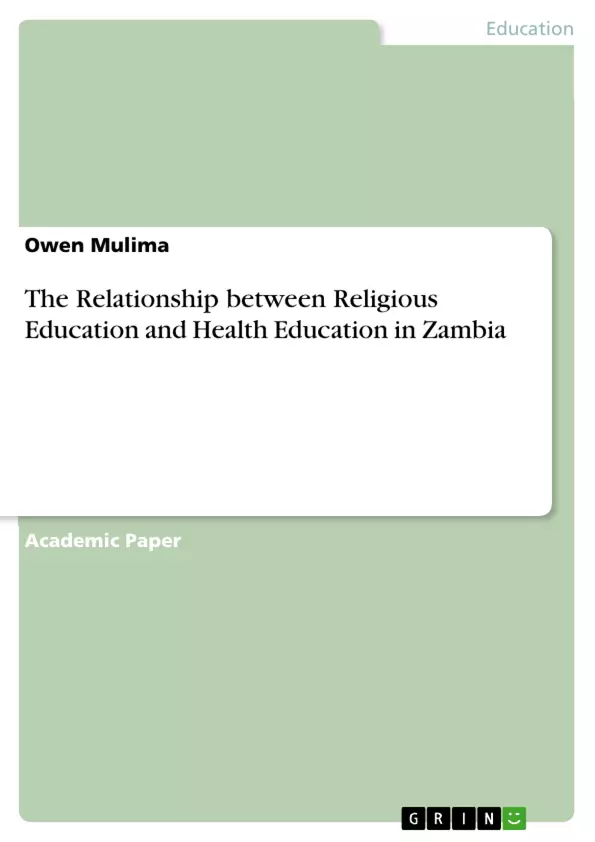Zambia is a country where religion plays a significant role in people's lives, and health education is becoming increasingly important. This study examines the relationship between religious education and health education in Zambia. It provides an overview of religious and health education in Zambia, explores the role of religion in promoting health and wellbeing, and discusses the potential benefits and challenges of integrating religious and health education in schools. The review draws on a range of literature sources, including academic articles, reports, and government documents. The findings suggest that while religious education can provide a strong foundation for promoting healthy lifestyles and practices, there are also potential risks associated with relying solely on religious teachings for health education. Therefore, a more integrated approach that combines both religious and health education is recommended.
Inhaltsverzeichnis (Table of Contents)
- Introduction
- Religious Education in Zambia
- Health Education in Zambia
- The Role of Religion in Promoting Health and Wellbeing
- Integration of Religious and Health Education
Zielsetzung und Themenschwerpunkte (Objectives and Key Themes)
This review of literature examines the relationship between religious education and health education in Zambia. It provides an overview of both subject areas in the country, explores the role of religion in promoting health and well-being, and discusses the potential benefits and challenges of integrating religious and health education in schools.
- The role of religious education in Zambia
- The role of health education in Zambia
- The potential benefits and challenges of integrating religious and health education
- The impact of religious beliefs and practices on health
- The importance of evidence-based health information
Zusammenfassung der Kapitel (Chapter Summaries)
- Introduction: This chapter provides an overview of the context in which religious education and health education operate in Zambia, highlighting the significant role of religion in society and the increasing importance of health education due to the burden of communicable and non-communicable diseases.
- Religious Education in Zambia: This chapter discusses the history and current state of religious education in Zambia's formal education system. It outlines the curriculum, the role of government in recognizing religious groups, and the aims of religious education in promoting religious knowledge and values.
- Health Education in Zambia: This chapter explores the various health education programs developed by the Ministry of Health in Zambia to promote healthy lifestyles and practices. It focuses on topics such as HIV/AIDS prevention, malaria prevention, maternal and child health, and nutrition.
- The Role of Religion in Promoting Health and Wellbeing: This chapter examines the potential positive and negative effects of religion on health and well-being. It highlights the potential of religious teachings and practices to promote healthy lifestyles, provide social support, and manage stress. It also discusses the risks associated with relying solely on religious teachings for health education.
- Integration of Religious and Health Education: This chapter explores the potential benefits and challenges of integrating religious and health education in schools. It examines studies that have explored the potential benefits of integration and considers the challenges of reconciling religious teachings with scientific evidence.
Schlüsselwörter (Keywords)
This review explores the relationship between religious education, health education, and wellbeing in Zambia. It examines the potential benefits and challenges of integrating these two areas in schools, considering key concepts such as evidence-based health information, religious beliefs and practices, and the importance of promoting holistic approaches to health and well-being.
Frequently Asked Questions
What is the focus of the study in Zambia?
The study examines the relationship between religious education and health education and how they can be integrated to promote wellbeing.
How can religious education support health goals?
Religious teachings can provide a strong moral and values-based foundation for promoting healthy lifestyles and social support within communities.
What are the risks of relying solely on religious teachings for health?
There is a risk that religious teachings may conflict with scientific evidence or lack crucial medical information, which is why an integrated approach is recommended.
Which health topics are most relevant in Zambian schools?
Key topics include HIV/AIDS prevention, malaria prevention, nutrition, and maternal and child health.
Does the government recognize the role of religion in education?
Yes, the Zambian government recognizes various religious groups and includes religious knowledge and values in the formal education curriculum.
- Arbeit zitieren
- Owen Mulima (Autor:in), 2023, The Relationship between Religious Education and Health Education in Zambia, München, GRIN Verlag, https://www.grin.com/document/1342645



